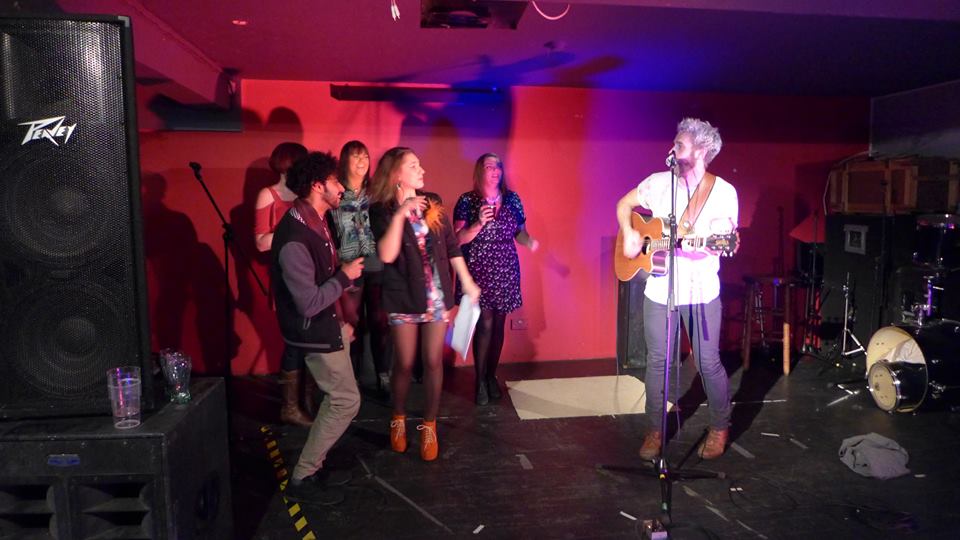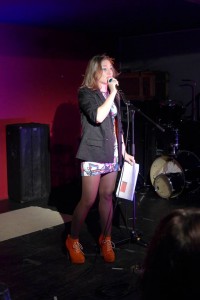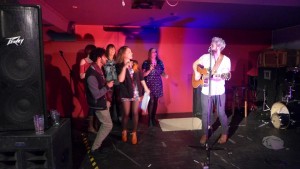Launch of Rock Life: 17 Poems from the Welsh Valleys by Gemma June Howell (Nos Da, Cardiff, 20/11/15)
-Reviewed by Renn Hubbuck-Melly–
As I stepped down into the basement venue of Nos Da, a broken floorboard bounced under my foot with a squeaky creak. There was a smell of chips in the air, and people were gathered around the stage at the back of the room. Laz Lazarus was reading his ever vivid and rich poetry beneath a violet light. Just as I got my drink at the bar and set my bags down, Lazarus voiced his last line.
It was the launch of Gemma June Howell’s book ‘Rock Life’. She has written a collection of seventeen poems inspired by life in the Valleys in Wales, all based on an estate called ‘the Rock’. As I sipped, Howell sprang up onto the stage, excitement brimming on her features. This event had been organised by her and you could see that she was pleased it had finally come to fruition.
Another invited reader, J Brookes, shared some of the poems in his newly released book, ‘Book’. These were musical, poignant and full of resonant lines such as ‘nothing’s old and tired beneath the sun.’
Now it was time for Howell to read from ‘Rock Life’. People settled into their red velvet seats and we all waited for the poet to begin. Standing almost directly under a disco ball, Howell gave us some background and explained how the collection came about. Speaking of it as a ‘labour of love’, the poet told us she had been writing the collection since 2008. Nigel Jenkins, former director of creative writing at Swansea University, championed her to write these poems. They reflect the realities of life in the Welsh Valleys, and its challenges.
The first poem she read was ‘Rude Boy Ruminations’, about a young man living in the house forged by ‘his grandfather. A miner who’d slogged to make his country great’. The poem recalls a time when the house once had dignity but has since become a ‘wasteland’, a place where the young man spends his days smoking cannabis and drinking. As the opening poem of the collection and this performance, it captured a desolation that has bled into all areas of Valleys life; these old mining towns, which once gave working class people a chance to build their own lives, have now become barren and ineffectual.
Howell uses colloquial language and a strong Welsh Valleys dialect in both the written and the spoken versions of her poems. Her use of voice really accentuates the authenticity of her characters. Before she read out the next poem, ‘Benefit Fraud’, Howell explained that she ‘published this collection of poems because no one else would’, and perhaps this poem would explain why that might be. ‘Benefit Fraud’ is a first person monologue in the voice of a man who’s on state benefit. He repeats the word ‘bollucks’ many times throughout at an accusation that he hasn’t paid the right amount of money. After arguing his innocence, he proclaims that ‘yewuh the fucken fraudstuz butt, no’mee.’ Howell draws on the stigma attached to being on benefits in this poem, and further emphasises this by saying that she believes this might be why people have refused to publish her work.
‘Another Bun in the Oven’, which has also appeared in a Bloodaxe collection, is unashamedly crude and candid. It depicts a woman who enjoys mouthing off, and who talks about how the father of her unborn baby is ‘shaggen round’ and ‘dizunt giva shit’ about his child. ‘Jobseeker’s Disagreement’ depicts the life a person who is unemployed. The mundanity of being jobless is stressed, with the repetition of the line ‘stuck in iss coun-sull flat all day’. The character talks of how they were banned from the job centre because, apparently, they were heard to say that ‘this is wank’. As a result, they ended up ‘livin off thuh food bank.’
These poems play with unreliable narrators and the reader is never sure what to believe. Of course, injustices happen, but it’s not always clear who is to blame. The same ideas and themes weave throughout these poems, which describe the repetitive and static lives of some in the Valleys. Many characters are on the dole and in revolt against a system which both gives them an income but also keeps them down. We sympathise with these characters and come to understand their struggles.
Howell has a warm presence on stage; she is informal and treats the audience as if we are close friends. At one point, she even says: ‘I keep forgetting you are all here, [I] feel like I’m in my bedroom’. Her presence is open and unguarded. After a big swig of lager, she put down ‘Rock Life’ and finished her set with a short story from her other published title ‘Inside the Treacle Well’.
After a break, the event continued with some musical acts. Beatbox Hann, who runs many of the beatbox events in Wales, including the Welsh Beatbox Championships, wowed everyone with his fast-paced, multi-layered music. There was an amazing vituosity to the sounds created, not just by his mouth, but also a bass which resonated throughout the room. He was joined by a young rapper, Chew, who gave us a frank piece about the government and his personal life. His rap included lines like ‘I’ve lost so many to suicide and drugs’, sharing a similar unapologetic attitude to Howell and a committment to expressing the truth about his experiences. Chew and Hann’s partnership worked well on stage and their energy filled the room.
The final performer was Geraint Rhys from Swansea whose music has been described as ‘political pop’. It was just him and a guitar, and his songs explored the problems faced by ‘the lost generation’ today. All the songs had similar themes, asking questions such as ‘where do we stand?’ and, in another, ‘what’s become of us?’ With his last song he encouraged people to come up on stage and dance, which they did, one of them being Howell, and the event ended with a sense of fun and several very wiggly hips!
This event was more than a launch for a collection of poems – it was a celebration. Howell’s performance was direct and honest, and she gives voice to a group of people who are usually unseen or misrepresented. It was refreshing to hear those Valleys accents, and to get to know characters who feel abandoned and are seen as being outside of society. They still have their own way of life; their own language. Many of the acts shared this sentiment. It was only fitting that after her thanks to all the acts and to the audience for coming along that Howell invited everyone to join her for a drink. And, we did.




